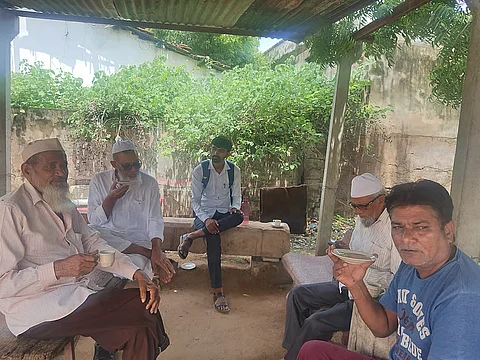

Gathaman village in Banaskantha district hasn’t held a panchayat election since 1955
Hindu and Muslim communities alternate leadership roles through mutual agreement
Despite no government grant under the Samras Yojana, the tradition continues
The 2025 Sarpanch, Raufaben Imran Patel, was unanimously selected
Grant blocked due to a reserved seat for ST despite no ST residents in the village
In June 2025, Gujarat held elections in 4,564 Gram Panchayats. Of these, 761 were declared Samras — villages where leaders are elected unopposed by consensus. These villages qualify for financial grants under the state’s Samras Gram Yojana, a policy that began under Narendra Modi’s tenure as Chief Minister.
Yet, long before this scheme existed, the village of Gathaman in Palanpur taluka, Banaskantha district, was quietly setting a different example — one not driven by incentives but by intercommunal trust.
Despite having around 4,600 registered voters in a population of 7,000, no Gram Panchayat election has taken place in Gathaman since 1955. Instead, leadership is decided through a tradition of mutual consultation between Hindu and Muslim communities, which form nearly equal halves of the population.
According to 71-year-old Ibrahim, “Our elders decided after independence that Panchayat elections would never involve voting. We have kept that promise since the first Sarpanch was chosen in 1955.”
The practice continues even in the absence of official financial support. In 2012, the village received a grant under the Samras Yojana, but since then, bureaucratic obstacles have blocked access to further funds.
Although Gathaman follows the principles of Samras, it is disqualified from receiving state grants due to a reserved Scheduled Tribe (ST) ward. Ironically, no ST residents live in the village. The seat remains vacant and under the scheme’s rules, even a single vacant seat makes a Panchayat ineligible for the grant.
Former deputy Sarpanch Umar Bhai says this ward was reserved decades ago when a government officer temporarily registered in the area. “He left, but the reservation stayed. Despite repeated efforts, we haven’t been able to remove the seat from records.”
In the 2025 Panchayat cycle, the post of Sarpanch was reserved for women. The Muslim community held an internal meeting and chose Raufaben Imran Patel, wife of Imran Khan, as their nominee. The following day, a joint meeting was held with Hindu community leaders, who approved the choice unanimously.
“It’s understood that if the Sarpanch is from one community, the Deputy Sarpanch will come from the other,” explained Abu Bakar, a 70-year-old village elder. The Deputy Sarpanch post has yet to be filled this year.
In the previous term, Kunwarji Dalwadia, a Hindu, served as Sarpanch, while Umar Bhai Selia, a Muslim, held the deputy post — upholding the rotational balance that has defined Gathaman's politics for generations.
Gathaman’s economic profile is also unique. While agriculture remains common, the village has a longstanding tradition of watch repair as a livelihood. Many families have members living in Mumbai, where they once worked as watchmakers and now increasingly work in mobile phone repairs, adapting with the times.
The village’s annual Panchayat budget is approximately ₹32 lakh. Though financial incentives from the state have been elusive, the commitment to consensus-based governance remains unshaken.
Dalwadia, the former Sarpanch, said: “Even without Samras money, we’ll never stop this tradition. It’s not just a system — it’s who we are.”
This is Part 2 of our series on Gujarat’s Samras Panchayats. Read Part 1 on Raningpara village